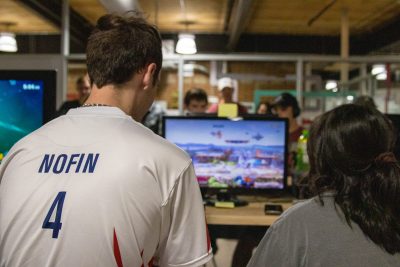ST. GEORGE — Below a floor of treadmills, rock climbing walls, pools and weight racks, a different competitive scene has found a new home in Utah Tech’s massive Human Performance Center: Electronic Sports or esports.

The club’s new room is equipped with four side-by-side, wide-screen TVs, a Nintendo Switch, an Xbox One and 12 powerful gaming computers provided through the university’s partnership with Dell. Two multi-monitor PCs officiate the club’s online streaming platforms, where club members can join remotely.
Danny Finnegan, the club’s president and a senior studying interaction design, spoke about the club’s purpose and how Utah Tech is tackling the massively competitive esports scene, where video game players can earn millions of dollars a year.
“With gaming, there’s so much depth in almost every new game that’s coming out,” Finnegan said. “Esports-wise, you can sink hundreds and thousands of hours and get new experiences, meet new people and level up your game.”
“A lot of our players are that unreachable audience, the people who don’t show up to big events on campus, athletic events. They’re like hermits, but they can find a community here that shares all their interests, and they can find school spirit with us.”
Growing up with video games like “Pokemon,” Finnegan began competing in buy-in tournaments for “Super Smash Bros” when he was 16.
Finnegan said his first tournament was one to remember. He went to a small gathering of gamers at Game Haven in St. George, not knowing any of the other players. The tournament was double-elimination. Finnegan quickly lost both of his matches.
“Yeah, I got totally slapped, but I also met some of my would-be longest friends.”

Despite getting “slapped” in defeat, Finnegan continued going to local tournaments, honing his own gaming skills by analyzing his playstyle and other players’ matches, noticing mistakes that could be capitalized on. Eventually, Finnegan consistently won first-place in tournaments.
His success led him to organize the tournaments himself and join Utah Tech’s esports team, where he coaches “Super Smash Bros” players and leads the club.
The esports club has “open lab days” where any member can come into the club room and play games of their choice. However, the majority of club activity revolves around its six competitive gaming teams, one team per game: “Overwatch 2,” “Valorant,” “Call of Duty,” “Rocket League,” “Super Smash Bros: Ultimate” and “League of Legends”.
Each team has different spots on a team roster, with generally one substitute “bench” player per team. Each team has tryouts at the beginning of the semester.
“We have coaches and managers set up for each team that set up schedules between the busy college students in order to have training regiments,” Finnegan explained. “We educate coaches on different strategies they can use to manage their team and encourage them to research the meta game and watch pro play.”

Similar to the world of sports, Utah Tech esports coaches put their players through drills and matches in the video games that isolate and develop specific skills unique to each game. Coaches stress the importance of clear communication between players in order to adapt play to the competition per game.
Teams follow along as coaches walk through past games and analyze mistakes and strengths of the team and competitors, like a football coach analyzing past game film.
“We have practice twice a week, three times a week. We typically don’t go over that because these are college students with jobs, typically, and we don’t want to cause burnout,” Finnegan said.
Team practices depend on the video game. “League of Legends,” for example, has average match lengths of 30 to 40 minutes, leading the practices to be even longer.
Finnegan said Utah Tech esports scrimmages and competes against other colleges, such as Utah Valley University and Southern Utah University for large-scale tournaments, and Utah Tech esports hosts weekly tournaments for “Super Smash Bros” in the Atwood Innovation Plaza.
Depending on the size of the tournament throughout the year, cash prizes can range from $20 to $1000.
While there are some comparisons between physical sports and Esports, Finnegan said, he likes to think of esports as its own entity. One strength esports has over many physical sports, he said, is its accessibility.

Utah Tech Esports had about 200 members last semester, and around 600 people follow the club’s Instagram page and Discord server. Finnegan expects the club to continue to expand. Once the Student Union Building is complete on campus, the esports club will move again to expand its available member space even further
On November 11, Finnegan said, Utah Tech will host an open gaming event with Utah sponsor Ken Garff Esports.
The event will aim to give high school and college students an opportunity to play games, connect with other gamers and find out more information about competing in high-level esports.
Copyright St. George News, SaintGeorgeUtah.com LLC, 2022, all rights reserved.